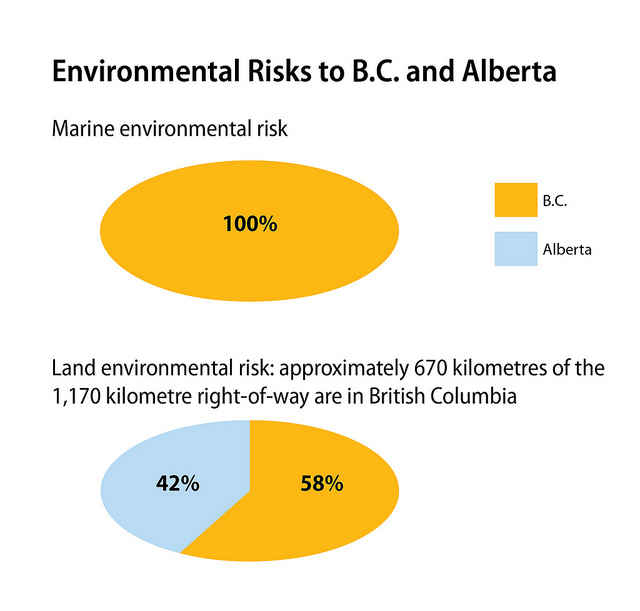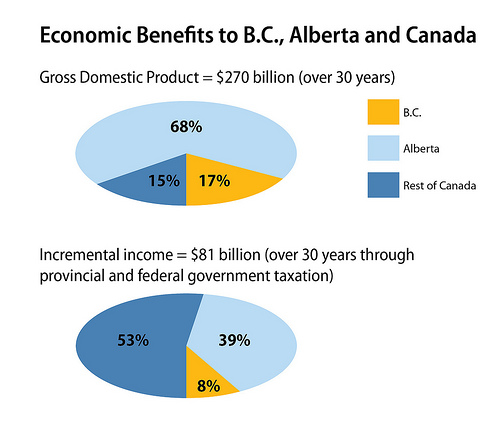Update 3 Joe Oliver statement
Update 2 Statement from Alison Redford
Update 1 Enbridge statement
The government of British Columbia has outlined five what it calls “minimum requirements that must be met for the province to consider the construction and operation of heavy oil pipelines within its borders.”
But at a news conference announcing the conditions, Environment Minister Terry Lake says the province will still not take an official position on the pipeline project itself.
In news release, Premier Christy Clark said, “Our government is committed to economic development that is balanced with environmental protection. In light of the ongoing environmental review by the Joint Review Panel on the Enbridge pipeline project proposal, our government has identified and developed minimum requirements that must be met before we will consider support for any heavy oil pipeline projects in our province. We need to combine environmental safety with our fair share of fiscal and economic benefits.”
Later Monday afternoon, Enbridge released a statement saying:
We wish to reiterate our commitment to working with governments, including BC, in determining what we can do to further address concerns and to engaging in a dialogue to ensure full understanding of the assessments of risk, the many safety and environmental protection measures in the plan as well as the benefits that would come with the project.
The premier of Alberta, Alison Redford, Monday evening released a stinging news release on the conditions outlined by British Columbia for pipelines crossing the province and tanker traffic on the coast.
A key phrase in the release says:
Leadership is not about dividing Canadians and pitting one province against another—leadership is about working together.
In Ottawa, the pro-pipeline Minister of Natural Resource, Joe Oliver, issued an unremarkable statement promoting responsible resource development that managed to avoid mentioning the BC announcement; a statement that could be regarded as a classical press release that says absolutely nothing.
Details of the BC provincial approach are outlined in a “heavy oil policy paper.”
The government also released background information on the conditions.
The five conditions are
- Successful completion of the environmental review process. In the case of Enbridge, that would mean a recommendation by the National Energy Board Joint Review Panel that the project proceed
- World-leading marine oil spill response, prevention and recovery systems for B.C.’s coastline and ocean to manage and mitigate the risks and costs of heavy oil pipelines and shipments
- World-leading practices for land oil spill prevention, response and recovery systems to manage and mitigate the risks and costs of heavy oil pipelines
- Legal requirements regarding Aboriginal and treaty rights are addressed, and First Nations are provided with the opportunities, information and resources necessary to participate in and benefit from a heavy-oil project
- British Columbia receives a fair share of the fiscal and economic benefits of a proposed heavy oil project that reflects the level, degree and nature of the risk borne by the province, the environment and taxpayers.
The release says that “any project proposal must be approved through appropriate environmental assessment (EA) processes.”

However, trust for the environmental processes has been falling since Stephen Harper’s government passed Bill C-38 which is designed to fast track approvals and is seen by may in the environmental movement as gutting the review process.
Action plan
The province is also proposing a joint plan of action with the federal government that would include the following elements:
- Limits to liability that ensure sufficient financial resources to properly address any spills;
increased federal response capacity; - Full adoption of the Unified Command model;
- Strengthened federal requirements on industry for the provision and placement of marine response equipment and infrastructure;
Industry-funded terrestrial (land-based) spill co-operative with sufficient human and technical capacity to manage spill risk from pipelines and other land-based sources; - Increased capacity within the provincial emergency response program to ensure adequate oversight of industry;
- A Natural Resources Damage Assessment process to provide certainty that a responsible party will address all costs associated with a spill.
In the release, BC Environment Minister Terry Lake said: “When we consider the prospect of a heavy oil pipeline, and of the increased oil tanker traffic that would result, it is clear that our spill prevention and response plans will require significant improvements. Our government has already initiated discussions with the federal government on improving our response plans and resources,” said Environment Minister Terry Lake. “This represents an opportunity for British Columbia and Canada to develop world-leading environmental protection regimes.”
First Nations
The government release says
The fourth requirement for the B.C. government to consider support for heavy oil pipeline proposals is First Nations participation. Governments in Canada have a duty to consult and accommodate First Nations, and British Columbia is committed to meeting this test. British Columbia has developed a set of tools to help First Nations to partner with industry and participate in economic development. These agreements help to create certainty for development that benefits all British Columbians. British Columbia remains committed to this approach.
“We believe the benefits to First Nations from major pipeline proposals must be clearly identified, along with the measures that will help protect against environmental impacts,” said Aboriginal Relations and Reconciliation Minister Mary Polak. “As recently as last week, such an approach was endorsed by the Canadian Council of CEOs in their report on Aboriginal participation.”
Show me the money
The government is also emphasizing that the province benefit from any heavy oil project:
Lastly, British Columbia must receive a fair share of the fiscal and economic benefits of any proposed heavy oil project. B.C. will shoulder 100 per cent of the risk in the marine environment and a significant proportion of the risk on the land should a spill event ever occur. Current heavy oil project proposals do not balance the risks and benefits for British Columbia.
“We have identified aggressive environmental requirements and principles for First Nations engagement, and we have clearly stated we expect a fair share of the fiscal and economic benefits for our province,” said Premier Clark. “British Columbians are fair and reasonable. We know we need resource and economic development, but we also expect that risks are managed, environmental protection is uncompromised and that generations will benefit from the decisions we make today.”

In its release, Enbridge repeated its earlier statements that the company will continue
to reach out and encourage conversation with British Columbians about the project through our website and blogs, community meetings and conversations. We have devoted much effort and resources into consultations with communities, First Nations, and Métis…”
The company went on to say:
Enbridge and the Northern Gateway project team have worked hard to ensure this unique project would be built and operated to the highest standards and has committed to further enhancements to make what is already a safe project even safer.
This project will bring real and tangible benefits to the communities and Aboriginal groups along the proposed route, and to the province of British Columbia as a whole.
.